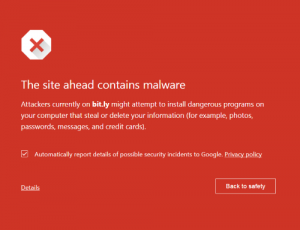With Google rankings having a massive impact on how much traffic your website receives, proper Search Engine Optimisation (SEO) practices are incredibly vital to the success of your website. For this reason, many web designers and developers spend hours on ensuring that their web content is SEO compliant.
According to a study by GoDaddy, 74% of hacked sites are hacked for SEO purposes. In an SEO-focused hack, hackers will add links to a website, add new web pages or alter your site’s robots.txt file to change the way Google indexes your site.
When a website is hacked, the SEO can be affected, resulting in the site being de-ranked or removed entirely from Google search results. For this reason, it is important that you keep your website secure and safe. So how can a hacked website affect SEO? Find out below.
3 ways hacking can affect your site’s SEO
1. Malicious content can affect SEO
Hackers will often implement malicious code into your website, which can put your users at risk. If this code is detected by Google, users will be presented with a warning upon entering your site.
Malicious code can result in your site being removed from search in order to protect users. The warnings will also likely affect bounce rate, which is a key ranking signal which Google uses.
2. Unexpected redirects can affect SEO
When a website is hacked, the hackers will often implement redirects, which send users to another web address when they arrive at your website. The redirects will often lead to pages that include malicious content such as phishing scams. In some cases, hackers will even try to replicate your website, tricking your users into sharing sensitive information.
When Google sees a redirect, it may assume that your site has been migrated to a new address. Upon following the redirect and being presented with questionable or malicious content, Google will have no choice but to protect its users by hiding or lowering the rank of your site.
3. Incoming and outgoing backlinks can affect SEO
Google judges the quality of a website by analysing how many other sites are linking to it, and what sites it links to. These links are commonly referred to as backlinks. It is important to note that backlinks vary in quality. For example, a backlink from a reputable source will affect your SEO positively whereas a backlink from an unsafe, or blacklisted website will negatively affect SEO.
When a website is hacked, links will often be added to the site, sometimes without the user even realising. These links can greatly affect Google ranking as they will lead your site’s users to unsafe, malicious content.
Although not technically “hacking”, negative SEO is a type of web attack which can affect your ranking. Your website may be flooded with backlinks from questionable sources, which can reduce the credibility of your site from the perspective of search engines.
How to prevent damage to your website via hacking:
Use a secure web host:
Many hacking attacks occur due to vulnerabilities in your hosting provider’s system. This can lead to your website, as well as other sites on the network being attacked. Using a secure, well-protected web host will improve the security of your website.
Additionally, a secure, fast host will also improve your site’s SEO. This is because security and speed are factors that Google uses tor rank websites.
Ideally, your host will offer the following:
- Support for custom SSL certificates
- Malware protection
- The option to back up data
Keep your website safe by upgrading to a more secure host today.
Learn more about our secure hosting services
Keep a backup of your website:
The longer your website remains hacked, the more likely Google is to notice and penalise it. For this reason, it is important that you have a backup ready to use as soon as it is needed.
Having a backup of your website can significantly minimise SEO damage caused by hackers. If your website is hacked, simply replace your files and database with the backed up version. Be sure to review your site’s security after afterwards, by changing login information or attempting to find the cause of the hack. This will prevent the hack from occurring again.
If you use a content management system such as WordPress, there are many available plugins such as UpdraftPlus which you can use to back up your files and database. For other types of website, search Google for a type of backup software that suits your needs.
Be sensible with passwords and login information:
A lot of compromised websites are a result of your login information being leaked or falling into the wrong hands. Using a secure login/password combination will keep your website safe from brute force login attempts, as well as other forms of common hacks.
If you are the administrator of a WordPress site, be sure to be original when naming other users, especially if other users have code-editing privileges. Usernames such as “admin”, “editor” and “test” should be avoided.
OPMC can provide secure hosting for your website and protect you from hackers
Perhaps you feel that your web host is unreliable or insecure, or perhaps you are tired of having to deal with hosting issues, website problems and bad performance. If so, we may be able to help you.
A secure web host can improve site performance, SEO, loading times and customer engagement, allowing low-ranking sites to rank higher, and higher ranking sites to stay on top and make more conversions.
Contact OPMC today to find out how our reliable, low maintenance and high-security hosting can help your business.
You can call us on (02) 9955 2237 or contact us using the form below.

